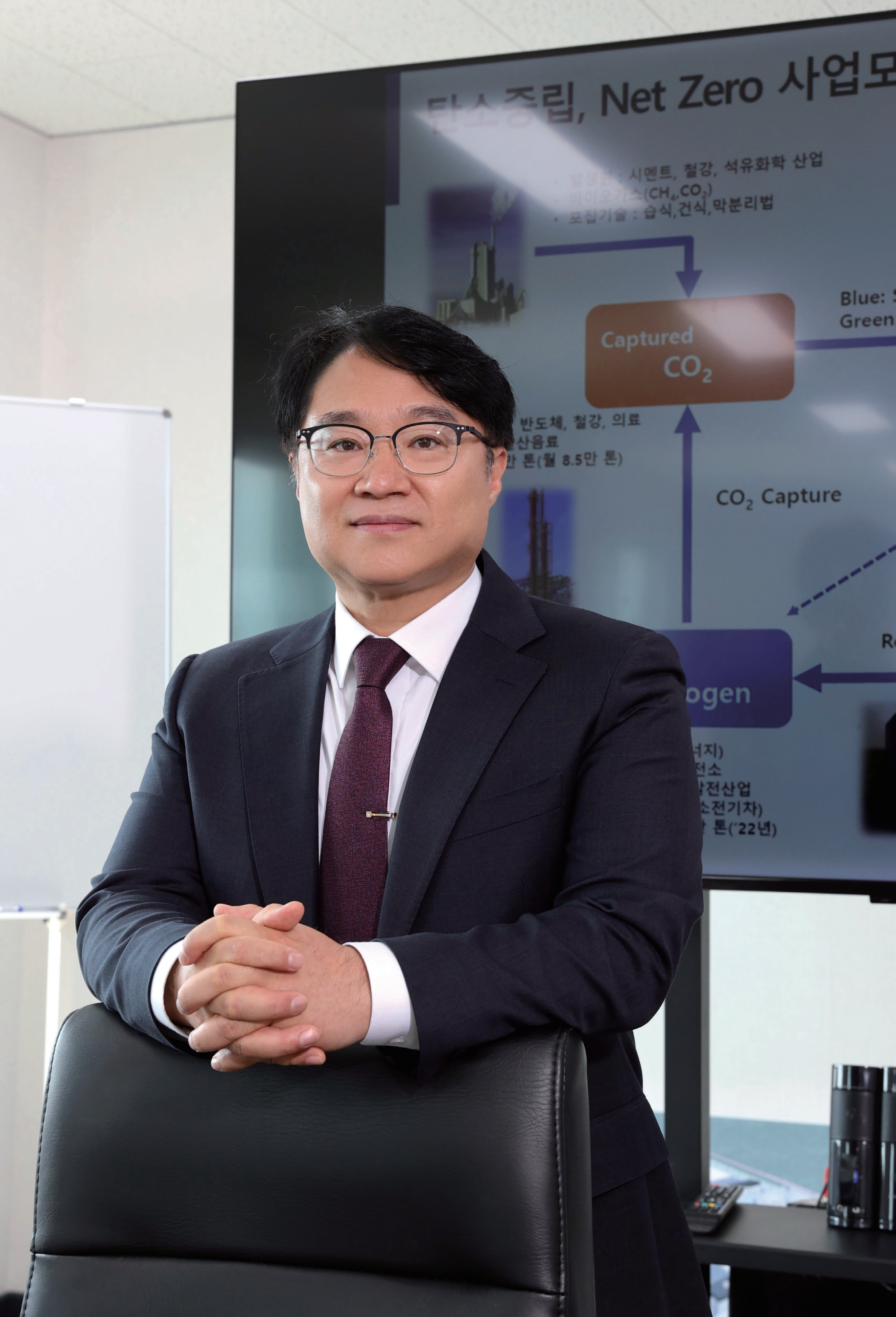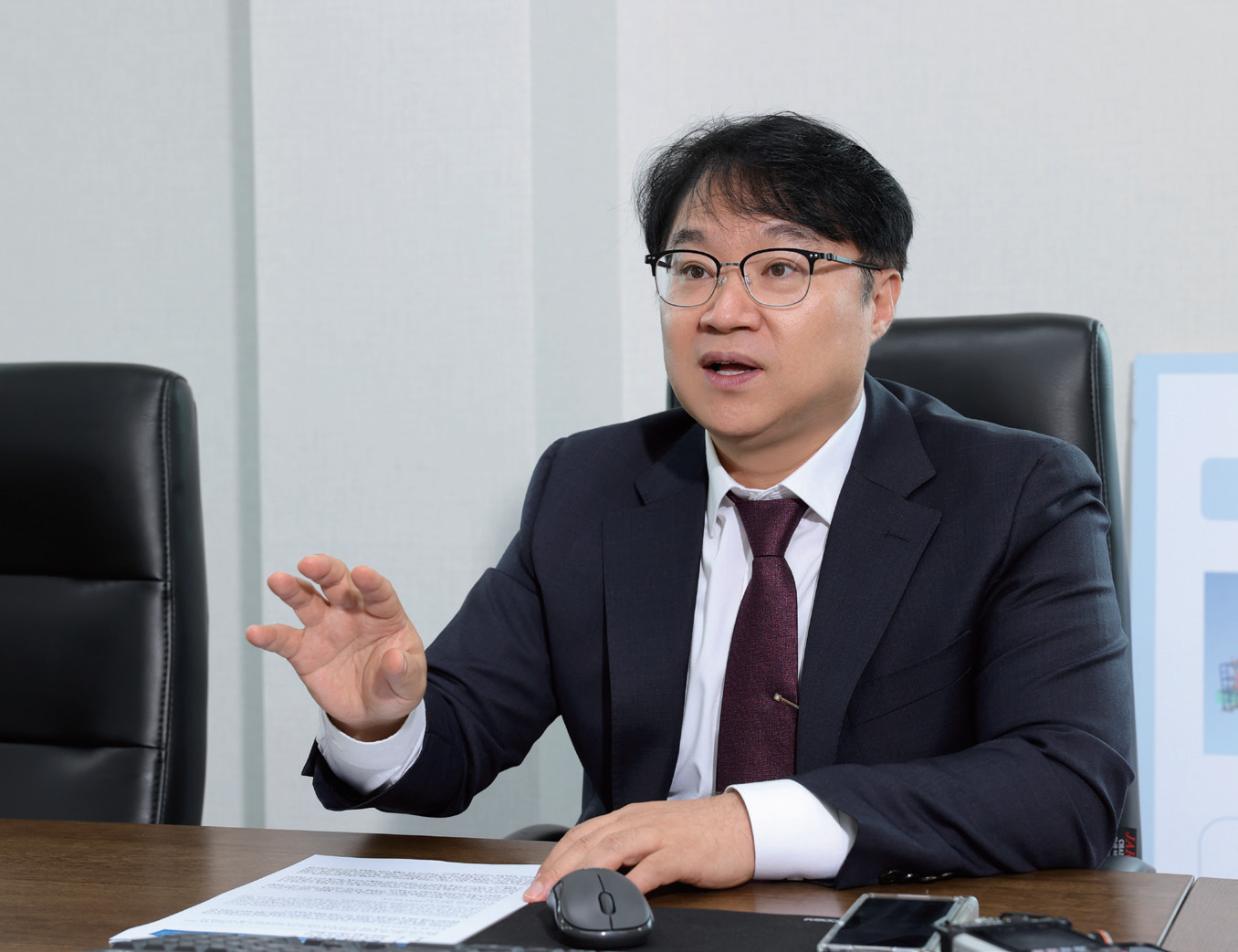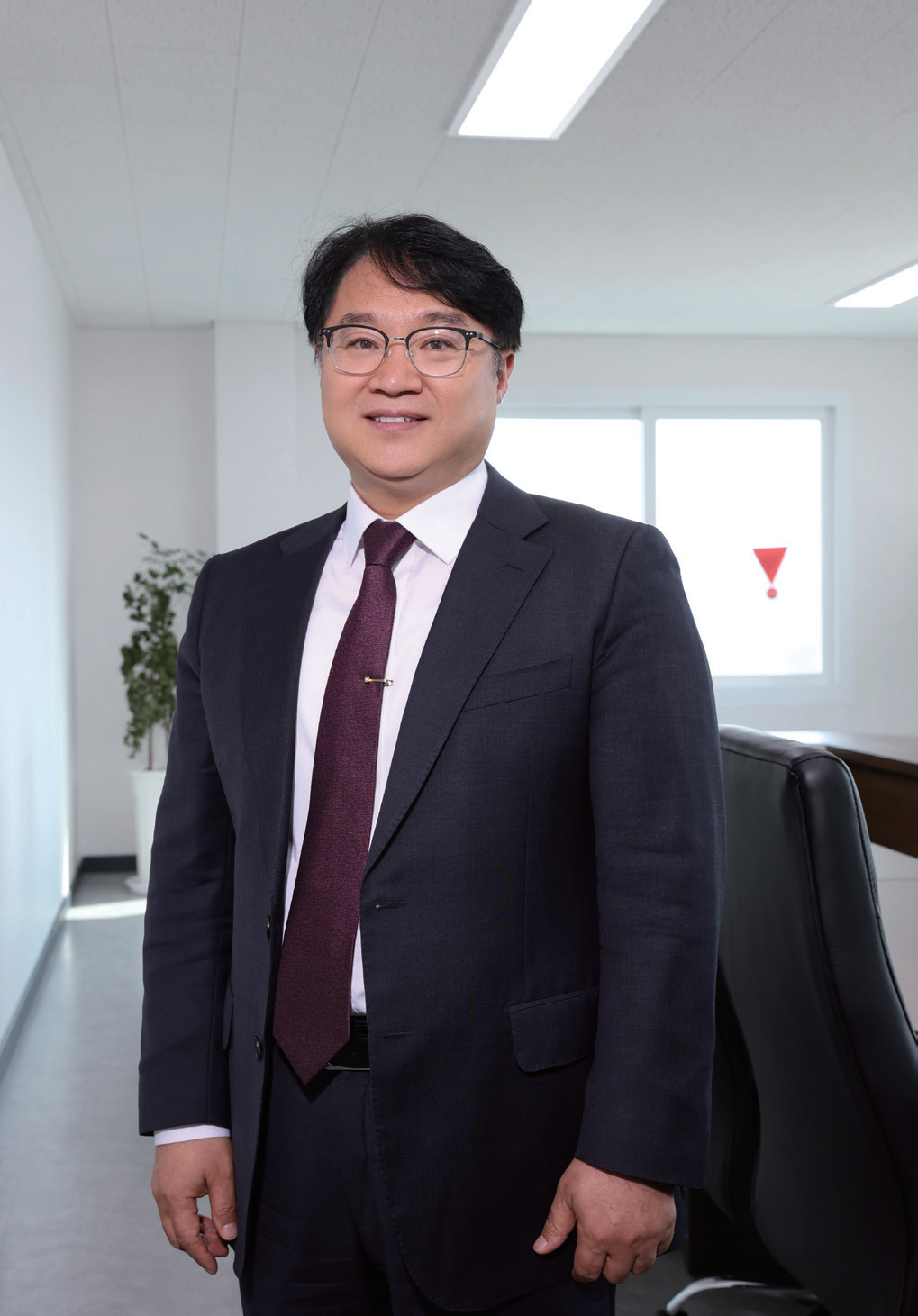[Planning] Monthly People November 23 issue - Bio Friends Inc. CEO Wonjun Cho
Biofriends Admin
view : 91
Developing energy technology for the coexistence of nature and humans, opening the future of the next generation of energy sources
BioFriends Inc.

Founded in 2016, Biofriends Inc. purifies, produces and sells DME (Dimethyl Ether) cleanly using its own technology. DME is attracting attention as a low-carbon energy that realizes carbon neutrality. Because it has similar chemical and physical properties to LPG, it is attracting attention as a new energy source that can utilize existing LPG infrastructure and at the same time satisfies energy demand as an alternative to LPG. Humanity in the 21st century faces a serious climate crisis, and climate change brings not only energy security issues but also disruption to the food ecosystem. The key keyword to solve this problem is also DME. While the world, including Europe, the United States, Japan, and India, is paying attention to DME, BioFriends is preparing to change the world with technology using it after introducing DME, which was a new market in Korea.
Realizing Carbon Neutrality with CCU Technology
Biofriends Inc. seeks to become a company that turns the energy crisis into an opportunity by utilizing E-Fuel and biofuel, which are circular energy sources. This is possible through CCU technology, which captures and recycles CO2, a greenhouse gas from atmospheric CO2 or industrial emissions, to create useful compounds and carbon-neutral, low-carbon products. Carbon dioxide is constantly produced in our daily lives and industries, causing various problems on Earth. Accordingly, a global agreement has been made to reduce carbon dioxide, the representative example being the Paris Agreement, and the core technology of the Paris Agreement is CCU.
Carbon capture (CC) refers to carbon dioxide capture, and carbon dioxide capture and utilization technology is called carbon capture utilization (CCU). BioFranz uses this CCU technology to manufacture low-carbon compounds, including the fuel sector's E-Fuel business, the business of pyrolyzing biogas plasma to manufacture CO2 clean hydrogen and carbon black, and the chemical industries such as methanol and DME as compounds.
E-Fuel refers to an electricity-based raw material made by synthesizing carbon dioxide and nitrogen with hydrogen obtained by electrolyzing water. The key here is clean water stations. This is because hydrogen must be obtained through water electrolysis such as bio-materials and green hydrogen, not fossil fuels. Although it is not technically impossible, there is a practical problem that the current technology cannot match the economic feasibility. BioFranz proposes a solution to utilize blue-green hydrogen in the intermediate bridge hydrogen ecosystem. It is a strategy to manufacture and sell carbon black to create CO2-Free hydrogen (green hydrogen) using methane gas, a clean raw material, and to secure economic feasibility. The technology used at this time is plasma electrolysis technology. The technology owned by BioFranz supports this, and it has recently completed a pilot facility test operation and is about to combine demonstration and commercialization projects. In the case of carbon black, if manufactured with special carbon black with high electrical conductivity, it is used as a conductor for secondary battery anode active material, and as it can be used for tires among general carbon black, a technology for manufacturing it is being developed. CEO Cho Won-joon expects 2027 to be the year when E-Fuel developed with such technology will be commercially sold. In addition, at this time, the scope of application is planned to be expanded not only to agricultural fuels, but also to fuels such as automobiles, ships, and aircraft.

DME will be the answer to energy transition through new market development
CEO Wonjun Cho, who worked at the KOGAS as the head of the DME Research Center, has experienced technology development and commercialization, including new energy projects in Korea and research on manufacturing synthetic fuels from methanol, DME and gas. During his time as a member of the energy business, he did not leave the prediction that carbon dioxide would cause serious problems around the world. When his worries continued, what caught his eye was methanol and DME, which are carbon-neutral fuels, and when he got the business idea, he decided to start a business after organizing his 23 years of public enterprise.
However, contrary to the desperate desire, 2016 when the company was founded was a time when even the concept of ESG management was not properly established. Therefore, hydrogen and clean fuel businesses were inevitably regarded as neither market nor business, and CEO Cho and other executives and employees of BioFranchise had to be frequently criticized. Fortunately, keywords of opportunities such as ESG management, carbon neutral economy, biofuel economy, and hydrogen economy began to come in front of them, who endured without pay with confidence in the future. After COVID-19, the energy paradigm shifted. It was an opportunity to catch it because the sincerity of CEO Cho and his employees, who constantly communicated the need for renewable energy for human survival, was steadily accumulated.
As the business model was recognized and reborn as a leading company in the DME market, BioFriends Inc. completed the first DME plant in Boeun, Chungbuk, in August 2020, and the second DME plant in August this year. Plant 1 produces and sells 5,000 tons of DME per year, and an additional 10,000 tons of DME per year are produced according to the completion of Plant 2. As DME can be converted and used for various purposes, CEO Cho intends to expand the scope of the business to export and sell technologies owned by the company, as well as sales of E-Fuel fuel that circulates carbon. In addition to securing awareness in Korea, it recently signed a cooperative partnership related to DME with Japan's government offices, and starting with this, it plans to actively establish cooperative relationships with various companies and institutions such as Indonesia, India, Norway, and the United States to create global partners.
"India has planned to reach carbon neutrality by 2070 as part of a five-point action plan that includes reducing emissions by about 50 percent by 2030. We have announced five pledges: to reduce total projected carbon emissions by 1 billion tons by 2030, reduce the economy's carbon intensity to 45%, and achieve the Net Zero target by 2070, and push for a policy to replace significant LPG imports with DME according to the Energy Investment Project Plan, which will realize this. In Europe and the United States, we have already started supply business in the LPG industry by mixing rDME with LPG as a greenhouse gas reduction project, and we are working on a specific plan to produce about 300,000 tons of rDME by 2027, as well as securing the site of the first commercial-grade rDME production plant in Tees Valley, England, and building a production plant. Along with this trend, I think that after 2027, humanity will be at the peak of the climate crisis. Our energy industry will be in the spotlight as a technological way to prepare for disasters around the world. There are many issues now, including economic issues, but it is certainly necessary to convert energy through the development of new markets for the future. I'm waiting for that timing."
Furthermore, BioFriends is conducting a hydrogen production project using domestic waste plastic as a government project, and is planning a project to produce clean hydrogen, low-carbon fuels emethanol, and eDME in connection with domestic companies. Overseas activities are also active. The business of producing methanol, DME and carbon black from synthetic fuels, including CO2 emitted from the Norwegian steel industry, is underway with Flogas, a Norwegian LPG company, and the business model using this is also in consultation with domestic petrochemical companies and steel companies to continue producing and selling low-carbon eco-friendly fuels. It has signed a business with Indonesia to manufacture 120,000 tons of methanol and DME annually, and Japan has signed an export MOU with LPG-DME mixed gas seller "Taiyo petroleum Gas Co., Ltd." to promote various eco-friendly low-carbon fuels or compounds sales, and exports 100 tons of DME abroad per month. In addition, negotiations are underway with Turkiye, India, Saudi Arabia, and Canada on exports and sales channels. Thanks to these achievements, it was also recognized as a hydrogen company in 2022.

So that DME, a next-generation energy source, can play its role in various fields.
BioFriends Inc. has not only introduced DME in Korea, but is also playing a leading role in solving world problems through DME technology. DME is a colorless, non-toxic combustible gas with a different combination structure and similar chemical formula to ethanol. It is an ether compound in which one oxygen molecule and two methane groups are combined, and it is evaluated as a next-generation energy source because it does not generate soot or soot during combustion. Although its physical properties are similar to LPG, carbon dioxide emissions are very low compared to LPG and diesel, and it can be obtained from various energy sources such as methane, methanol, and biomass as well as existing fuel resources, thereby reducing fossil fuel dependence. In addition, it is liquefied at -25°C at normal pressure and 5-6 bar at room temperature, making it very easy to store and easy to vaporize, making it easy to use.
BioFriends plans to use these specialized technologies to grow DME into agricultural fuel as the final goal. As the only company in Korea to start an agricultural fuel business using DME, it intends to continue to expand its E-Fuel fuel business in the agricultural and fishing sectors by dispersing DME as low-carbon fuel or using E-Fuel fuel in the energy transition era.
“Currently, we are prioritizing the DME fuel supply project focusing on rural areas in southern Chungcheongbuk-do, such as Boeun, Okcheon, and Yeongdong. Rural areas have always been vulnerable in the energy supply chain. For agriculture to be competitive, it must develop the ability to sustain itself without relying on the government. BioFriends is working toward a future where DME is used as agricultural fuel and is used as an agricultural energy source without receiving electricity subsidies. I want to save agriculture, which is in crisis due to labor shortage due to aging population. I also dream of establishing an agricultural school to develop energy conversion technology in response to climate change, smart farm technology, crop cultivation technology, and character development education that mediates and reconciles conflicts between the old and new generations. “Our goal is to operate a large-scale farm for mass production.”
Biofriends' DME manufacturing process is designed and constructed with its own technology, and is produced and refined to prevent harmful substances from occurring through dehydration of the reactor. It not only consists of the process of dehydrating DME from methanol, but also includes the process technology of manufacturing methanol and DME, which are key basic fuel materials for chemical plants using carbon dioxide. This can be said to have DME hydrogen reforming system technology of various sizes and applied to fuel cells and hydrogen stations to utilize DME as a hydrogen carrier. The recent DME triple distributed generator is also a system optimized for smart farms, registered as a patent in Korea as well as the United States.
CEO Wonjun Cho dreams of a future in which smart farms are transformed into an ecosystem that uses DME. Through distributed power generation, air-conditioning and heating are supplied to smart farms, and the emitted CO2 is purified to increase productivity through carbonic acid cultivation. The food problem can also be solved by high-tech agriculture through mechanization and automation in rural areas, or by running large farms and producing farmers. In addition, it gives new vitality to rural areas and farmers. This is because smart farms open up second possibilities for now retired farmers living in the age of 100. CEO Cho hopes that those who have been engaged in agriculture for a long time will not step down and learn smart farm technology and energy conversion technology to grow crops, and through this, they will be able to live a second life in the center of distribution connecting rural and urban areas. And it conveys its goal to do its part so that DME, E-Fuel, and biofuels can be placed at the center.
Source: Monthly People http://www.monthlypeople.com


 02 - 6739 - 1100~3
02 - 6739 - 1100~3 bftech@bfi.co.kr
bftech@bfi.co.kr